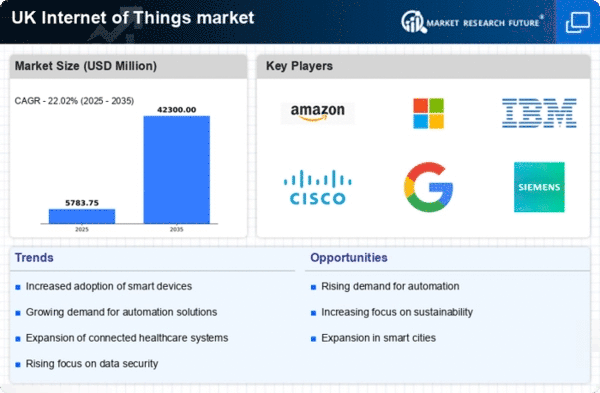Rising Demand for Automation
The Internet of Things market in the UK experiences a notable surge in demand for automation across various sectors. Industries such as manufacturing, logistics, and agriculture are increasingly adopting IoT solutions to enhance operational efficiency. For instance, the implementation of IoT devices can lead to a reduction in operational costs by up to 30%. This trend is driven by the need for real-time data analytics and improved decision-making processes. As businesses strive to remain competitive, the integration of IoT technologies becomes essential. The automation of processes not only streamlines operations but also contributes to sustainability efforts, aligning with the UK government's initiatives to reduce carbon emissions. Consequently, the rising demand for automation is a pivotal driver in the internet of-things market, fostering innovation and growth within the industry.
Expansion of 5G Infrastructure
The rollout of 5G technology in the UK significantly impacts the internet of-things market, facilitating faster and more reliable connectivity for IoT devices. With 5G networks expected to cover 90% of the UK population by 2026, the potential for IoT applications expands dramatically. This enhanced connectivity allows for the deployment of more sophisticated IoT solutions, such as smart transportation systems and connected healthcare devices. The increased bandwidth and lower latency associated with 5G enable real-time data transmission, which is crucial for applications requiring immediate responses. As a result, businesses are likely to invest heavily in IoT technologies that leverage 5G capabilities, driving growth in the internet of-things market. The expansion of 5G infrastructure thus serves as a critical enabler for the proliferation of IoT solutions across various sectors.
Government Initiatives and Funding
The UK government actively promotes the internet of-things market through various initiatives and funding programs aimed at fostering innovation and technological advancement. The UK Research and Innovation (UKRI) agency has allocated substantial resources to support IoT projects, with funding exceeding £100 million in recent years. These initiatives encourage collaboration between public and private sectors, facilitating the development of cutting-edge IoT solutions. Furthermore, government policies aimed at enhancing digital infrastructure and cybersecurity create a conducive environment for IoT growth. As businesses and startups leverage these resources, the internet of-things market is likely to witness accelerated development and adoption. The proactive stance of the government in supporting IoT initiatives is a significant driver, positioning the UK as a leader in the global IoT landscape.
Consumer Demand for Smart Home Devices
The internet of-things market in the UK is significantly influenced by the growing consumer demand for smart home devices. As households increasingly seek convenience, security, and energy efficiency, the adoption of IoT-enabled products such as smart thermostats, security cameras, and lighting systems is on the rise. Recent surveys indicate that over 50% of UK households are expected to own at least one smart device by 2026. This trend is further fueled by advancements in technology and decreasing costs of IoT devices, making them more accessible to the average consumer. Retailers are responding by expanding their offerings of smart home products, thereby driving competition and innovation within the market. The increasing consumer interest in smart home technology is a vital driver for the internet of-things market, shaping its future trajectory.
Integration of AI and Machine Learning
The integration of artificial intelligence (AI) and machine learning (ML) into the internet of-things market is transforming how data is processed and utilized. In the UK, businesses are increasingly leveraging AI and ML algorithms to analyze vast amounts of data generated by IoT devices. This integration allows for predictive analytics, enabling organizations to anticipate trends and make informed decisions. For example, predictive maintenance in manufacturing can reduce downtime by up to 20%, enhancing productivity. The synergy between IoT and AI/ML not only improves operational efficiency but also enhances user experiences through personalized services. As companies recognize the value of this integration, investment in AI-driven IoT solutions is likely to grow, further propelling the internet of-things market forward. The convergence of these technologies represents a significant driver of innovation and competitiveness within the industry.























Leave a Comment